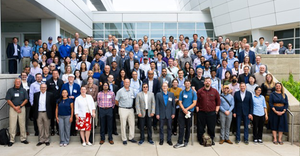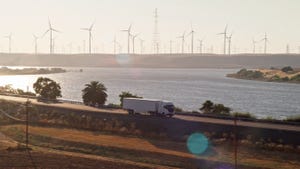Waste Management’s Driving Sustainability Conversation Focuses on the Next Four Years
Waste Management (WM) hosted the second virtual conversation in its two-part “Driving Sustainability” series. The chat focused on “The Next Four Years” and featured Nat Bullard, chief content officer of BloombergNEF, and Alex Wagner, journalist & author — in conversation with Tara Hemmer, SVP, field operations, WM. The discussion covered predictions, implications, and recommendations for the next U.S. Presidential term, as well as the importance of sustainable initiatives in restarting the economy.
Wagner began by observing that, “It’s an understatement to say it was an election unlike any other.” But “one section of the voting public was animated, and remains animated and deeply concerned about sustainability, and that’s young voters.” She believes that a Biden administration “has every intention of doing as much as it can” to push forward on sustainably-minded issues like these young voters want.
Hemmer then asked the panelists about their expectations over the next four years in the area of green initiatives, which — of course — are good for jobs, the environment, and the economy. Wagner noted that “it’s going to be really hard to pass legislation” because “the division between the two parties is really, really steep.” So, “we have a long way to go before you get to aisle-crossing on something like climate change,” and “a lot of things are going to have to be done by executive action.” But, she notes that Biden is smart in choosing to frame climate change not in the sense of being “good for the planet” but as a national security issue that will be taken on at the Defense and State Departments.
Bullard discussed the important role that business, and things like consumer incentives, can also play in driving change forward in the coming term. Just last week, a group of 40 companies including Wal-Mart, Amazon, and BP sent a letter to Congress and President-Elect Biden asking that the groups work together on climate impacts. Bullard noted that work done at this intersection of government and business can drive real change. And, “companies are asking for and agitating for the strongest disclosure they can get,” because it is “a distinction for their business” as well as a “signal” they want to send. This type of corporate behavior is “sort of in contradiction to what was coming from the White House and administration,
but businesses recognize that it’s “exhausting and counterproductive to swerve constantly between near-term policy signals administration to administration.” That’s why they “do things like set a net zero emissions target in the absence of internal regulation.”
Hemmer asked what other things the panelists are seeing “from either a policy perspective, or in the private sector” that provides optimism. They mentioned “mandatory disclosing of climate risk to financial regulators” and noted that this is happening in the U.K. and New Zealand — and that the U.S. Federal Reserve has made hints that it will do the same at some point. Also, “watch the financial community itself;” for instance, the New York State Retirement Fund just announced it would set a portfolio target of net zero.
On the topic of environmental justice, Wagner noted that the Biden administration seems to have an “energy and enthusiasm” to tackle this topic in a way that dovetails with the ways in which brown and black Americans have suffered the worst effects of the pandemic as well as climate change. The administration “knows they need to do something about this immediately,” framing it as an overarching issue that touches on every issue of importance. She noted that there is much broader support among the American public for the racial justice issue, more so than for the tradition blue/red climate-change issue. So, it’s an opportunity to “bring people into the fold” in the aftermath of the pandemic.
Hemmer asked, at this unique time, how businesses should be thinking about the market and access to capital. Bullard pointed out that “from the very basic math, money has never been cheaper,” and that it’s “never been a better time to borrow long if you are a credit-worthy institution.” His advice is to “look at where money is available, what you can do, how you can borrow long” — and also: “what are you going to do with the money?” He noted that it’s a good time to focus on infrastructure, and “there’s room to do so using available capital ideally and even more so in an advantageous way through green markets, sustainable debts, green bonds, sustainable loans and things like that.”
The discussion wrapped up with several audience questions and Hemmer’s request for each speaker to share what they would tell the new administration needed to be done, in 60 seconds or less. Bullard said, “I want every public and private corporation above $1 billion in assets to have a credible plan for reaching new zero emissions across their portfolio by the year 2040 and that will need to be disclosed to insurance regulators. It will be disclosed to market regulators and state legislators and Congress.”
Wagner noted that, “Mine is more of a narrative suggestion, which is that we are ending a year that has been unrelentingly dark. The administration needs to offer Americans a sense of hope, possibility, and concrete evidence that change is happening” on the climate-change issue. “They know they have to do it, but they’ve got to get the public engaged on it, and I think positivity and hope are going to be important especially after this year.”
About the Author
You May Also Like




